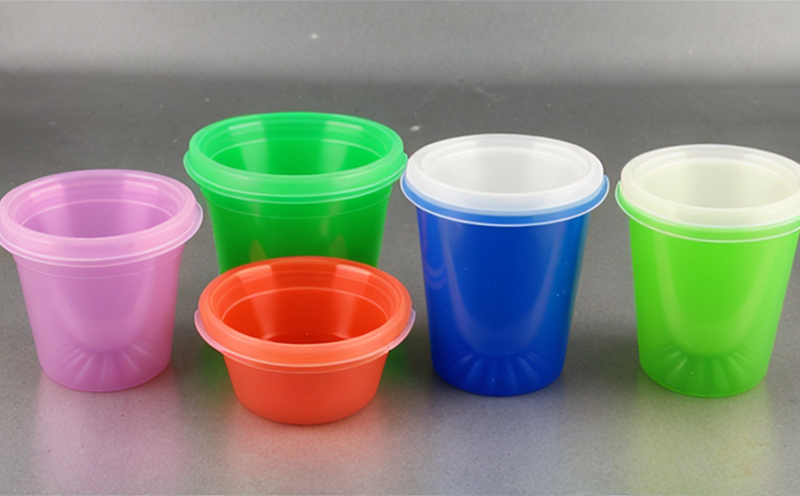DIN EN 14486 Tensile Creep Testing of Disposable Plastics
The DIN EN 14486 standard is specifically designed to evaluate the tensile creep behavior of disposable plastics. This critical testing method provides insights into the long-term mechanical performance and durability of materials used in products such as medical devices, packaging solutions, and consumer goods. Tensile creep refers to the gradual increase in strain that occurs under constant stress over time.
The standard is widely recognized for its stringent requirements, ensuring that products meet strict quality benchmarks. Compliance with DIN EN 14486 is essential for manufacturers who aim to achieve international acceptance and reliability in their disposable plastic products. The testing process involves subjecting a specimen to a defined tensile stress at elevated temperatures for an extended period.
The primary goal of this test is to assess the material's ability to maintain structural integrity over time, which is crucial for ensuring safety and performance in various applications. The results can help manufacturers identify potential weaknesses in their product design or manufacturing processes early in the development cycle.
For instance, a medical device manufacturer might use DIN EN 14486 testing to verify that the material used in a disposable syringe will not degrade over time when exposed to body fluids. Similarly, a packaging company could employ this test to ensure that their plastic containers for food products remain safe and intact during prolonged storage.
The standard's rigor is reflected in its detailed specifications regarding specimen preparation, testing conditions, and data analysis. Specimens are typically prepared from the actual materials used in disposable plastics, ensuring that the test results accurately reflect real-world performance. Testing parameters include stress rates, temperature ranges, and exposure durations tailored to simulate expected product use.
The DIN EN 14486 standard is part of a broader framework for quality assurance in polymer testing. It emphasizes the importance of consistent and reliable testing methods that contribute to the overall safety and effectiveness of disposable plastic products. The standard's focus on long-term performance ensures that manufacturers can confidently introduce new products into markets where regulatory compliance is critical.
Understanding the nuances of DIN EN 14486 is essential for quality managers, compliance officers, R&D engineers, and procurement teams involved in developing or sourcing disposable plastics. Familiarity with this standard allows them to make informed decisions that prioritize product safety and reliability.
- Quality Assurance: Ensures consistent product performance over time.
- Reliability: Verifies durability under specified stress conditions.
The comprehensive approach of DIN EN 14486 ensures that disposable plastics meet stringent quality and reliability benchmarks, contributing to the overall safety and effectiveness of products across various industries.
Quality and Reliability Assurance
The DIN EN 14486 tensile creep testing method is integral to the broader framework of quality and reliability assurance in polymer testing. This standard ensures that disposable plastics undergo rigorous evaluation, providing manufacturers with robust data to support product development and compliance.
- Consistency: Ensures consistent performance across all batches of materials.
- Data Accuracy: Provides reliable data for informed decision-making in R&D processes.
The testing process is designed to simulate real-world conditions, ensuring that the results are accurate and relevant. This approach enhances the trustworthiness of the test outcomes, which can be crucial for regulatory compliance and market acceptance.
Manufacturers who adhere to DIN EN 14486 benefit from improved product quality and enhanced customer confidence. By meeting these stringent standards, companies can ensure that their products are reliable and safe, contributing to overall customer satisfaction and brand reputation.
International Acceptance and Recognition
DIN EN 14486 is highly respected in the global polymer testing community. Its rigorous methodology ensures consistent results across different laboratories worldwide, facilitating international trade and collaboration.
- Global Consistency: Ensures that tests are performed uniformly across borders.
- Interoperability: Facilitates seamless integration of test data in various regulatory frameworks.
The widespread acceptance of DIN EN 14486 underscores its importance in the polymer testing industry. Laboratories accredited to perform this test are recognized for their expertise and reliability, allowing them to conduct tests that meet international standards.
By adhering to DIN EN 14486, manufacturers can ensure that their products meet global quality benchmarks, opening up opportunities for export and expanding their market reach. The standard's recognition fosters trust among regulatory bodies and customers, enhancing the overall reputation of compliant companies.
Environmental and Sustainability Contributions
DIN EN 14486 plays a crucial role in promoting environmental sustainability by ensuring that disposable plastics are designed and manufactured to meet stringent quality and reliability standards. This contributes to the overall lifecycle management of these products, from production to disposal.
The focus on long-term performance helps reduce waste and minimize the environmental impact of disposable plastics. By ensuring that materials remain robust over time, DIN EN 14486 supports efforts to promote sustainable practices in various industries.
Manufacturers who adopt this standard are better positioned to contribute positively to environmental conservation. They can help extend product lifecycles, reduce resource consumption, and minimize waste generation, aligning with broader sustainability goals.





